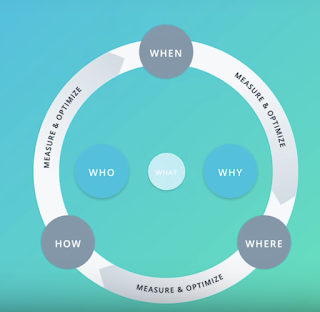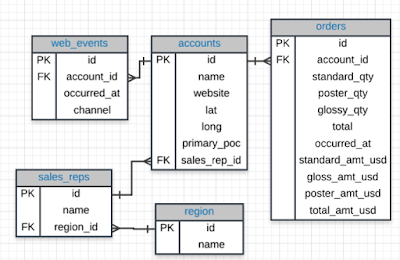Organization -> Account -> Property -> View(use filters)
Sunday, January 28, 2018
[Google Analytics for Beginners] 01. Intro
Hierarchy:
Organization -> Account -> Property -> View(use filters)
Organization -> Account -> Property -> View(use filters)
[Content Marketing] 02. Content Marketing
1. Content Elements
+ personalization
- personalization works the best
+ length
- Respect Your Audience's Time
- use appropriate length for your target audience and the customer journey
+ language
- Avoid jargon
- Straightforward and simple messaging is the best
- positive language > negative language
+ voice & tone
+ memory, emotion and motivation (human-ness)
- infographics (images help people memorize content better)
2. Story
SCQA Framework
s: situation: the state of affairs
c: complication: the thing that's changed
q: question: the question raised by S and C
a: answer: the answer to Q
Pixar Framework
Once there was a ...
Everyday...
Until one day...
Because of that ...
Because of that...
Until finally...
Ever since then...
3. Essential Elements of Story
- character
- conflict
- resolution
4. Best Practices
Useful Website for content creation:
1) search for 'how to' on Google
2) Google Trends
https://trends.google.com/trends/
3) Answer the Public
https://www.answerthepublic.com/
5. Repurpose Content
1. Change the format of the content
2. Change the target audience for the content
6. Curate Content
Curation: the process of sorting through content from various sources and presenting it in a meaningful way.
7. Buzzfeed Golden Rules of Shareability
+ Don't use tricks
+ Be yourself
+ Make content you would be proud to share
+ Experiment
+ Have a heart
+ personalization
- personalization works the best
+ length
- Respect Your Audience's Time
- use appropriate length for your target audience and the customer journey
+ language
- Avoid jargon
- Straightforward and simple messaging is the best
- positive language > negative language
+ voice & tone
+ memory, emotion and motivation (human-ness)
- infographics (images help people memorize content better)
2. Story
SCQA Framework
s: situation: the state of affairs
c: complication: the thing that's changed
q: question: the question raised by S and C
a: answer: the answer to Q
Pixar Framework
Once there was a ...
Everyday...
Until one day...
Because of that ...
Because of that...
Until finally...
Ever since then...
3. Essential Elements of Story
- character
- conflict
- resolution
4. Best Practices
Useful Website for content creation:
1) search for 'how to' on Google
2) Google Trends
https://trends.google.com/trends/
3) Answer the Public
https://www.answerthepublic.com/
5. Repurpose Content
1. Change the format of the content
2. Change the target audience for the content
6. Curate Content
Curation: the process of sorting through content from various sources and presenting it in a meaningful way.
7. Buzzfeed Golden Rules of Shareability
+ Don't use tricks
+ Be yourself
+ Make content you would be proud to share
+ Experiment
+ Have a heart
Sunday, January 21, 2018
[Content Marketing] 01. Content Marketing Intro
Content Strategy & Marketing
Content: your message, which often includes or is a variation of your value proposition.
Format: the manner in which content is arranged or presented, e.g., video, blog
The Content Marketing Process
1. Plan
2. Create
3. Distribute
4. Analyze
(repeat... )
Use your target persona as the starting point
The target persona will influence your content:
- Purpose
- Format
- Topic
Content needs to align with the customer journey
How to create remarkable content (potential customers)
1. buyer personas
2. the buyer's journey
Content
Hero: big, tent-pole events; large scale, with longer lifetime
ex) product launch, special conference, etc.
Hub: blog, regular posts; "push content"
ex) blog
Hygiene: created with search in mind, product tutorials, to-do, frequently asked questions
ex) "how-to" contents, FAQs, etc.
Saturday, January 20, 2018
[Marketing] 04. Empathy Map: Potential Interview Questions
As a marketer, you will want to cater your interview questions to the product/service
you will be marketing.
If you have chosen to market Enterprise you’ll want to use questions
like the ones outlined in this blog post
by Hubspot: 20 Questions to Ask When Creating Buyer Personas
you will be marketing.
If you have chosen to market Enterprise you’ll want to use questions
like the ones outlined in this blog post
by Hubspot: 20 Questions to Ask When Creating Buyer Personas
If you’ve chosen to market the Digital Marketing Nanodegree
we’ve provided a list of potential questions below:
we’ve provided a list of potential questions below:
Personal Background
1. Describe your personal demographics.
Are they married?
1. Describe your personal demographics.
Are they married?
What's their annual household income?
Where do they live?
How old are they?
Do they have children?
2. Describe your educational background.
What level of education did they complete?
2. Describe your educational background.
What level of education did they complete?
Which schools did they attend?
What did they study?
Get specific here. "Boston University" is better than "liberal arts college."
3. What is your job role? Your title?
Get specific here. "Boston University" is better than "liberal arts college."
3. What is your job role? Your title?
4. How long have you had this role and title?
Hobbies
1. What do you like to do in your free time?
2. What are you interested in?
Challenges/Barriers
1. What are your biggest challenges professionally/personally?
2. Is price or time a concern for the goals you want to achieve?
3. What setbacks prevent you from achieving your goals?
Do you feel like you don’t have enough information?
Are you not sure where to start?
Have you started researching at all?
Goals
1. What are your professional/personal goals?
1. What are your professional/personal goals?
How is your work/life balance?
2. Where do you see yourself in the next five years?
A new role in the same industry?
A completely new role in an entirely different industry?
3. How have your goals changed in the past 3 years?
[Marketing] 03. Who, When, Where & Why
Who: Understand Your Customer
1) develop empathy maps
2) develop a target persona
- background & demographics
- hobbies
- goals
- needs
- barriers
When: Understand the Customer Journey
- awareness: how and when a customer first becomes aware of you
-> broadcast channels: espn, the huffington post, buzzfeed
- interest: when a customer knows about you and becomes interested in your offer
-> social channels
- desire: when a customer knows about you and wants what you offer
-> social & search: twitter, google, yahoo, expedia, bing...etc.
- action: when a customer knows about you, wants your offer, and is ready to take action
-> search channels: keyword search ad
- post action: when a customer has taken the action
-> 1:1 channels: text, email
Where: Marketing Channels
Different types of channels:
- broadcast: expose ads to larger audiences who 'pass by'
e.g. display ads on website
- 1:1: speak directly to your customer
e.g. email, text message
- search: reach customers when they have shown interest
e.g. search advertising
- social: create conversations around your product
e.g. Facebook, Instagram ad
Paid, Owned and Earned Media
- paid: you pay to show your content
- owned: content you author and host
- earned: content others write about you (free)
Why: Marketing Objectives & KPI
smart marketing objective are:
S pecific
M easurable
A chievable
R elevant
T time phased
ex) Acquire 50,000 new online customers for women apparel this financial year.
Raise brand awareness by driving 100k new unique visitors to the website this month.
KPI: KEY PERFORMANCE INDICATORS
Key: important
Performance: how you're doing
Indicator: often a metric or a value
ex) marketing ROI, number of incremental sales, number of leads, net promoter score, email engagement score...etc.
1. identify objective
2. select primary kpi
3. map metrics to your kpi
Metrics and KPIs
example)
Objective: build brand awareness
Primary KPI: website visitors
metrics:
inbound links
referral visits
media mentions
new visitors
Metrics
CPM - cost per mile or cost per thousand
CTR - click-through rate
CPC - cost per click
CPA - cost per acquisition
CPL - cost per lead
CR - conversion rate
ROI - return on investment
CLTV - customer lifetime value
VTR - view through rate
[Marketing] 02. Your Business
Core components of a business:
Value Proposition:
Business Models
B2B: business to business
B2C: business to people
Terms
Business Cycle
startup: sustainable interest
-> growth: growth over time
-> mature: profit
-> decline: revive growth
- revenue
- cost
- product/service
- customers
Value Proposition:
- for - target customer
- who - statement of the need/ opportunity
- our - product or service/ category
- that - statement of benefit
- unlike - closest competitor
- our offer - a primary differentiator
Business Models
B2B: business to business
B2C: business to people
Terms
- Revenue
- Cost of Goods Sold(COG)
- Gross Profit: Revenue - COG
- AOV: average order value
- Return on Investment(ROI)
- Lifetime Value(LTV)
Business Cycle
startup: sustainable interest
-> growth: growth over time
-> mature: profit
-> decline: revive growth
[Marketing] 01. Digital Marketing Framework
I've started taking Digital Marketing Nanodegree at Udacity from Jan 2018.
I'm going to write down what I've learned from the course!
I know nothing about digital marketing and I've started this course purely out of my interest.
I am working as a product manager in the advertising field,
so there definitely is a certain overlap between my work and digital marketing.
Let's get started and improve my skill in digital marketing!
Marketing:
the action or business of promoting and selling products or services, including market research and advertising.
Frameworks:
what: your offer
who: your customers
when: your customer's journey
why: your marketing objective
how: your message
where: channels your customers use
measure & optimize using tools like Google Analytics

I'm going to write down what I've learned from the course!
I know nothing about digital marketing and I've started this course purely out of my interest.
I am working as a product manager in the advertising field,
so there definitely is a certain overlap between my work and digital marketing.
Let's get started and improve my skill in digital marketing!
Marketing:
the action or business of promoting and selling products or services, including market research and advertising.
Frameworks:
what: your offer
who: your customers
when: your customer's journey
why: your marketing objective
how: your message
where: channels your customers use
measure & optimize using tools like Google Analytics

Subscribe to:
Comments (Atom)
SQL Joins
Database Normalization: Are the tables storing logical groupings of the data? Can I make changes in a single location, rather than in...

-
1. Search Engine Optimization is Important Only 5.6% of clicks reach beyond the first page of search results. The first top 3 keywords ...
-
I've started taking Digital Marketing Nanodegree at Udacity from Jan 2018. I'm going to write down what I've learned from the c...
-
Ad extensions: Enhance your Google Search Ads with additional, relevant information and give people reasons to check out your business. ...



